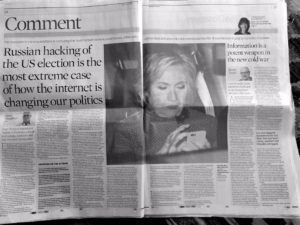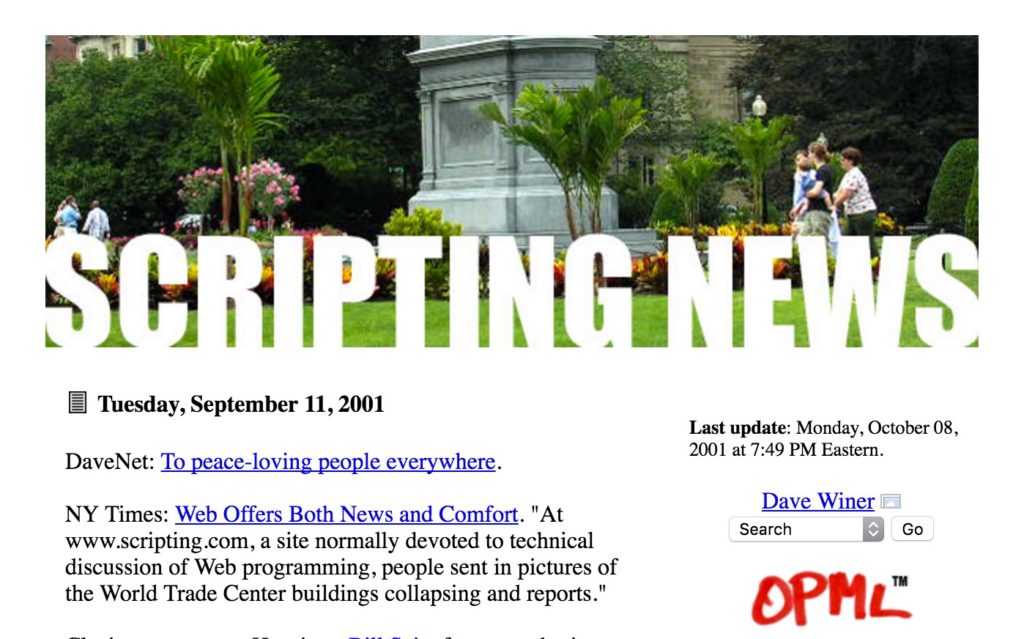“As soon as it works, no one calls it AI any more.”
Don’t let WhatsApp nudge you into sharing your data with Facebook
This morning’s Observer column:
When WhatsApp, the messaging app, launched in 2009, it struck me as one of the most interesting innovations I’d seen in ages – for two reasons. The first was that it seemed beautifully designed from the outset: it was clean, minimalist and efficient; and, secondly, it had a business model that did not depend on advertising. Instead, users got a year free, after which they paid a modest annual subscription.
Better still, the co-founder Jan Koum, seemed to have a very healthy aversion to the surveillance capitalism that underpins the vast revenues of Google, Facebook and co, in which they extract users’ personal data without paying for it, and then refine and sell it to advertisers…
Ah yes. That was then. But now…
How the Internet is changing our politics
My longish opinion piece on the US election in today’s Observer. (Hint: it’s not all good news.)
Ever since the internet went mainstream in the 1990s people wondered about how it would affect democratic politics. In seeking an answer to the question, we made the mistake that people have traditionally made when thinking about new communications technology: we overestimated the short-term impacts while grievously underestimating the longer-term ones.
The first-order effects appeared in 2004 when Howard Dean, then governor of Vermont, entered the Democratic primaries to seek the party’s nomination for president. What made his campaign distinctive was that he used the internet for fundraising. Instead of the traditional method of tapping wealthy donors, Dean and his online guru, Larry Biddle, turned to the internet and raised about $50m, mostly in the form of small individual donations from 350,000 supporters. By the standards of the time, it was an eye-opening achievement.
In the event, Dean’s campaign imploded when he made an over-excited speech after coming third in the Iowa caucuses – the so-called “Dean scream” which, according to the conventional wisdom of the day, showed that he was too unstable a character to be commander-in-chief. Looked at in the light of the Trump campaign, this is truly weird, for compared with the current Republican candidate, Dean looks like a combination of Spinoza and St Francis of Assisi…
Quote of the Day
“Conspiracy theories are like mosquitoes that thrive in swamps of low-trust societies, weak institutions, secretive elites and technology that allows theories unanchored from truth to spread rapidly. Swatting them one at a time is mostly futile: The real answer is draining the swamps.”
Zeynep Tufecki, writing in today’s New York Times.
Chatham House interview
Recorded at the Royal Institute for International Affairs on May 9, 2016. Meant to put it up ages ago and, well, forgot…
Diplomatic language
Simon Kuper, one of my favourite columnists, has a nice piece in the FT Magazine (sadly, behind a paywall) about what states (and their diplomats) say about others in private.
I particularly like this transcript of a 1971 conversation between Richard Nixon and Henry Kissinger analysing a recent visit by the Prime Minister of India, Indira Gandhi:
Kissinger Well, the Indians are bastards anyway… While she was a bitch, we got what we wanted too…”
Nixon “We really slobbered over the old witch.”
Or how about this 2011 exchange between Nicholas Sarkozy (then President of France) and Barack Obama about the Israeli Prime Minister, Benjamin Netanyahu?
Sarkozy “I can’t stand him. He’s a liar.”
Obama “You’re tired of him? What about me? I have to deal with him every day.”
In recent times, Britain’s new Foreign Secretary, Boris Johnson, is having to live down some of the things he’s said. For example:
“The only reason I wouldn’t visit some parts of New York is the real risk of meeting Donald Trump.”
Johnson also compared Hillary Clinton to “a sadistic nurse in a mental hospital”.
Well, at least that gets the niceties out of the way, whoever wins the election.
Quote of the Day
“Globalisation empowers elites economically but disempowers them politically.”
Michael Ignatieff, reviewing Nick Clegg’s memoir in the FT.
Remember, remember the ninth of September
For personal reasons I have vivid memories of 9/11, so today is always a sombre day in my calendar. But I was suddenly reminded this morning of how some of my Internet buddies rose magnificently to the challenge of the day. This is Dave Winer’s Scripting.com blog, for example. And here are Jeff Jarvis’s audio reports, as unforgettable now as they were then.
And then this memoir by the WSJ‘s John Bussey.
The long history of ‘cyber’
My Observer piece on Thomas Rid’s alternative history of computing, The Rise of the Machines: the Lost History of Cybernetics:
Where did the “cyber” in “cyberspace” come from? Most people, when asked, will probably credit William Gibson, who famously introduced the term in his celebrated 1984 novel, Neuromancer. It came to him while watching some kids play early video games. Searching for a name for the virtual space in which they seemed immersed, he wrote “cyberspace” in his notepad. “As I stared at it in red Sharpie on a yellow legal pad,” he later recalled, “my whole delight was that it meant absolutely nothing.”
How wrong can you be? Cyberspace turned out to be the space that somehow morphed into the networked world we now inhabit, and which might ultimately prove our undoing by making us totally dependent on a system that is both unfathomably complex and fundamentally insecure. But the cyber- prefix actually goes back a long way before Gibson – to the late 1940s and Norbert Wiener’s book, Cybernetics, Or Control and Communication in the Animal and the Machine, which was published in 1948.
Cybernetics was the term Wiener, an MIT mathematician and polymath, coined for the scientific study of feedback control and communication in animals and machines. As a “transdiscipline” that cuts across traditional fields such as physics, chemistry and biology, cybernetics had a brief and largely unsuccessful existence: few of the world’s universities now have departments of cybernetics. But as Thomas Rid’s absorbing new book, The Rise of the Machines: The Lost History of Cybernetics shows, it has had a long afterglow as a source of mythic inspiration that endures to the present day…
Time to stop firms sailing under the ‘tech’ flag of convenience
This morning’s Observer column:
The rise and precipitous fall of Theranos is a cautionary tale for our times and is beautifully told by Nick Bilton of Vanity Fair in a fascinating article that is worth reading in full. For me, though, it has a wider significance, because it illustrates a more general problem with corporations that sail under the tech banner, namely their loud insistence that any attempt to regulate them constitutes an attempt by the analogue world to stifle innovation and hold back the digital future.
At the moment, most governments and almost all mainstream media are so dazzled by digital technology that they seem unable to appreciate what’s really going on. What’s happening is that the internet and its associated technologies have morphed from exotic novelties into a general purpose technology (GPT) like mains electricity. That has two implications. The first is that the companies that have mastered the technology are moving out of the tech compound and into the wider world. This is why Apple is planning to move into the automobile business, Tesla is heading for trucking, Google is moving into healthcare, Uber is aiming to eliminate car ownership altogether and Airbnb has the global hotel business in its sights.
The second implication is that, as Anil Dash puts it in an insightful essay, there is no “tech” industry any more…


